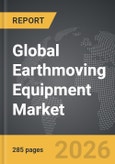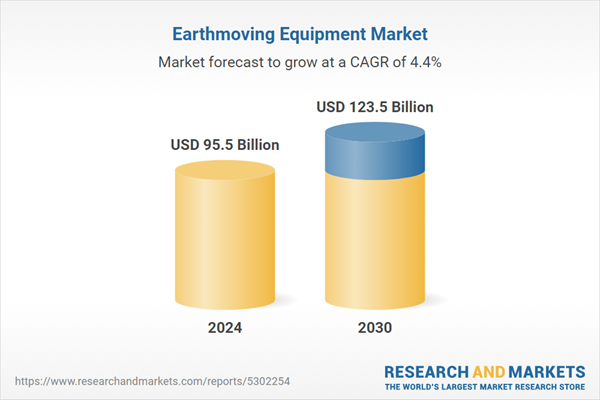Global Earthmoving Equipment Market - Key Trends and Drivers Summarized
What Is Earthmoving Equipment and How Does It Function?
Earthmoving equipment encompasses a broad category of heavy-duty machinery designed to excavate, move, and grade large quantities of soil, rock, and other materials, making them essential for construction, mining, and infrastructure projects. These machines are specifically engineered to handle the demands of heavy material movement and operate in rugged conditions, ensuring efficiency, safety, and precision on job sites. The primary types of earthmoving equipment include excavators, bulldozers, backhoes, loaders, and motor graders, each with specialized functionalities tailored for different tasks. Excavators, for example, use a hydraulic arm and bucket to dig trenches and lift heavy materials, while bulldozers, equipped with a large front blade, are ideal for pushing large volumes of soil or debris. Loaders, on the other hand, are designed to scoop and transport materials, making them crucial for site preparation and material handling. Most of these machines operate on powerful diesel engines, providing the necessary torque to move heavy loads over varied terrains. The use of advanced hydraulics, sophisticated control systems, and rugged tracks or tires enhances their stability and maneuverability, allowing them to work effectively in difficult terrains such as quarries, mines, or large construction sites. The versatility of earthmoving equipment is further amplified by the wide range of attachments available, such as rippers, grapples, and hydraulic hammers, which can be swapped out to perform specific tasks with greater efficiency.Why Is Earthmoving Equipment Essential in Construction and Mining Projects?
Earthmoving equipment is critical to the success of construction and mining projects due to its ability to handle massive loads, improve operational efficiency, and ensure worker safety in demanding environments. In construction, these machines are used for site preparation, foundation digging, trenching, road building, and grading, making them indispensable for both residential and commercial projects. Without earthmoving equipment, large-scale earthworks would be labor-intensive, time-consuming, and prone to errors, resulting in significant project delays and increased costs. Their precision and power enable construction teams to complete tasks faster and more accurately, minimizing disruption and maintaining project timelines. In mining, earthmoving equipment plays an even more crucial role, as it is used to extract, haul, and transport massive volumes of earth and ore in surface mining operations. Large machines such as hydraulic shovels, draglines, and giant haul trucks are engineered to operate in extreme conditions, ensuring the efficient extraction and movement of mineral resources. These machines are equipped with reinforced structures, powerful engines, and advanced hydraulic systems to withstand the abrasive and demanding conditions of open-pit mines. Beyond efficiency, earthmoving equipment also enhances safety on job sites. By automating hazardous tasks and minimizing manual labor, these machines reduce the risk of accidents and injuries, which are common in heavy earthmoving and excavation work. The ability to maintain stable operation on uneven terrains and steep inclines further ensures that safety is prioritized without compromising on performance.What Innovations Are Revolutionizing the Earthmoving Equipment Industry?
The earthmoving equipment industry is undergoing significant innovation, driven by advancements in automation, connectivity, and sustainable technologies. One of the most transformative trends is the adoption of autonomous and semi-autonomous machinery, which is reshaping how large-scale construction and mining projects are executed. Companies are deploying excavators, bulldozers, and haul trucks equipped with GPS, LiDAR, and artificial intelligence (AI) systems that enable precise positioning, real-time monitoring, and automated operation. These smart machines can work continuously, without breaks, and are capable of performing complex tasks like digging, hauling, and grading with minimal human intervention, thereby increasing productivity and reducing labor costs. Another major development is the integration of telematics and fleet management systems, which allow for real-time tracking, diagnostics, and performance monitoring. Operators and managers can remotely monitor fuel consumption, engine health, and machine utilization, optimizing maintenance schedules and reducing downtime. This data-driven approach enhances overall fleet efficiency and helps companies make informed decisions about equipment usage and investments. Sustainability is also becoming a key focus area, with manufacturers introducing hybrid and electric earthmoving equipment to reduce emissions and comply with stringent environmental regulations. Electric excavators, for example, offer the same power and performance as their diesel counterparts while significantly reducing noise and emissions, making them ideal for urban construction sites and environmentally sensitive areas. Additionally, advances in materials science are leading to the development of lighter, more durable components that extend machine life and reduce fuel consumption. The use of augmented reality (AR) and virtual reality (VR) for operator training and machine diagnostics is another innovation gaining traction, allowing operators to simulate complex tasks and troubleshoot issues in a safe, controlled environment.What Factors Are Driving the Growth of the Earthmoving Equipment Market?
The growth in the earthmoving equipment market is driven by several factors. One of the primary drivers is the expansion of urban infrastructure and construction projects worldwide. Rapid urbanization, especially in emerging economies, has led to a surge in demand for residential and commercial construction, road building, and public infrastructure projects. Governments are investing heavily in large-scale infrastructure initiatives, such as highways, bridges, airports, and energy facilities, to support economic growth and improve connectivity. This has created a significant demand for earthmoving equipment that can perform tasks efficiently and on a large scale. The mining sector is another major contributor to market growth. The rise in global commodity prices and the growing need for minerals and metals have led to increased mining activities, particularly in regions rich in natural resources like Australia, Africa, and South America. Surface mining operations require specialized earthmoving equipment capable of handling large loads and operating in harsh environments, driving demand for robust machinery like excavators, haul trucks, and wheel loaders. Additionally, technological advancements are making modern earthmoving equipment more productive, safer, and easier to operate. Features such as automated controls, GPS-guided navigation, and real-time telematics are helping operators achieve greater precision and efficiency, further boosting the appeal of these machines. The growing focus on sustainability is also influencing the market, with manufacturers developing eco-friendly models that meet stringent emissions regulations and offer lower operating costs. Finally, the trend toward rental and leasing services is expanding the market by making high-quality earthmoving equipment more accessible to smaller contractors and companies that may not have the capital to invest in new machinery. Collectively, these factors are driving strong growth in the earthmoving equipment market and shaping its future as a technologically advanced and indispensable segment of the construction and mining industries.Report Scope
The report analyzes the Earthmoving Equipment market, presented in terms of market value (US$ Thousand). The analysis covers the key segments and geographic regions outlined below.- Segments: Product Segment (Excavators, Backhoes, Compaction Equipment, Loaders, Other Product Segments); Application (Construction, Surface Mining, Underground Mining).
- Geographic Regions/Countries:World; United States; Canada; Japan; China; Europe (France; Germany; Italy; United Kingdom; Spain; Russia; and Rest of Europe); Asia-Pacific (Australia; India; South Korea; and Rest of Asia-Pacific); Latin America (Argentina; Brazil; Mexico; and Rest of Latin America); Middle East (Iran; Israel; Saudi Arabia; United Arab Emirates; and Rest of Middle East); and Africa.
Key Insights:
- Market Growth: Understand the significant growth trajectory of the Excavators segment, which is expected to reach US$36.2 Billion by 2030 with a CAGR of a 5%. The Backhoes segment is also set to grow at 3.9% CAGR over the analysis period.
- Regional Analysis: Gain insights into the U.S. market, valued at $25.3 Billion in 2024, and China, forecasted to grow at an impressive 6.5% CAGR to reach $25.8 Billion by 2030. Discover growth trends in other key regions, including Japan, Canada, Germany, and the Asia-Pacific.
Why You Should Buy This Report:
- Detailed Market Analysis: Access a thorough analysis of the Global Earthmoving Equipment Market, covering all major geographic regions and market segments.
- Competitive Insights: Get an overview of the competitive landscape, including the market presence of major players across different geographies.
- Future Trends and Drivers: Understand the key trends and drivers shaping the future of the Global Earthmoving Equipment Market.
- Actionable Insights: Benefit from actionable insights that can help you identify new revenue opportunities and make strategic business decisions.
Key Questions Answered:
- How is the Global Earthmoving Equipment Market expected to evolve by 2030?
- What are the main drivers and restraints affecting the market?
- Which market segments will grow the most over the forecast period?
- How will market shares for different regions and segments change by 2030?
- Who are the leading players in the market, and what are their prospects?
Report Features:
- Comprehensive Market Data: Independent analysis of annual sales and market forecasts in US$ Million from 2024 to 2030.
- In-Depth Regional Analysis: Detailed insights into key markets, including the U.S., China, Japan, Canada, Europe, Asia-Pacific, Latin America, Middle East, and Africa.
- Company Profiles: Coverage of players such as Atlas Copco, Bharat Earth Movers Limited, Bobcat Company, Case Construction Equipment, Hitachi Construction Machinery Co. Ltd. and more.
- Complimentary Updates: Receive free report updates for one year to keep you informed of the latest market developments.
Some of the 42 companies featured in this Earthmoving Equipment market report include:
- Atlas Copco
- Bharat Earth Movers Limited
- Bobcat Company
- Case Construction Equipment
- Hitachi Construction Machinery Co. Ltd.
- Ingersoll Rand Inc.
- New Holland Construction
- The Liebherr Group (Bulle)
- Track Marshall
- Volvo Construction Equipment
This edition integrates the latest global trade and economic shifts into comprehensive market analysis. Key updates include:
- Tariff and Trade Impact: Insights into global tariff negotiations across 180+ countries, with analysis of supply chain turbulence, sourcing disruptions, and geographic realignment. Special focus on 2025 as a pivotal year for trade tensions, including updated perspectives on the Trump-era tariffs.
- Adjusted Forecasts and Analytics: Revised global and regional market forecasts through 2030, incorporating tariff effects, economic uncertainty, and structural changes in globalization. Includes historical analysis from 2015 to 2023.
- Strategic Market Dynamics: Evaluation of revised market prospects, regional outlooks, and key economic indicators such as population and urbanization trends.
- Innovation & Technology Trends: Latest developments in product and process innovation, emerging technologies, and key industry drivers shaping the competitive landscape.
- Competitive Intelligence: Updated global market share estimates for 2025, competitive positioning of major players (Strong/Active/Niche/Trivial), and refined focus on leading global brands and core players.
- Expert Insight & Commentary: Strategic analysis from economists, trade experts, and domain specialists to contextualize market shifts and identify emerging opportunities.
Table of Contents
Companies Mentioned (Partial List)
A selection of companies mentioned in this report includes, but is not limited to:
- Atlas Copco
- Bharat Earth Movers Limited
- Bobcat Company
- Case Construction Equipment
- Hitachi Construction Machinery Co. Ltd.
- Ingersoll Rand Inc.
- New Holland Construction
- The Liebherr Group (Bulle)
- Track Marshall
- Volvo Construction Equipment
Table Information
| Report Attribute | Details |
|---|---|
| No. of Pages | 285 |
| Published | January 2026 |
| Forecast Period | 2024 - 2030 |
| Estimated Market Value ( USD | $ 95.5 Billion |
| Forecasted Market Value ( USD | $ 123.5 Billion |
| Compound Annual Growth Rate | 4.4% |
| Regions Covered | Global |









